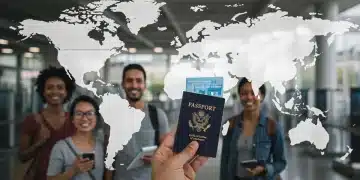Digital Nomad Families in the US: Navigating Challenges & Opportunities

The rise of digital nomad families in the US presents unique challenges and opportunities, balancing location independence with the responsibilities of raising children while maintaining a stable income and educational environment.
The **rise of digital nomad families in the US: Challenges and Opportunities** has become a significant trend, reshaping traditional family structures and lifestyles. As technology advances and remote work becomes increasingly prevalent, families are embracing location independence, seeking to combine work, travel, and raising children in unconventional ways.
The Allure of Digital Nomadism for US Families
Digital nomadism, once primarily associated with young, single individuals, is now attracting families seeking a more flexible and fulfilling lifestyle. The ability to work remotely, coupled with a desire for travel and diverse experiences, is driving this trend among US families.
Flexibility and Freedom
One of the primary drivers behind the rise of digital nomad families is the promise of flexibility and freedom. Traditional 9-to-5 jobs often confine families to specific locations, limiting their ability to explore the world and experience different cultures.
- Work-Life Integration: Digital nomadism allows parents to integrate work and family life more seamlessly, spending more time with their children and being actively involved in their upbringing.
- Location Independence: Families can choose to live in locations that offer a lower cost of living, better weather, or unique cultural experiences, without sacrificing their income or career prospects.
- Educational Opportunities: Travel exposes children to diverse environments, cultures, and learning opportunities that cannot be replicated in a traditional classroom setting.
For many families, the allure of designing a life that prioritizes experiences over possessions is a powerful motivator. Digital nomadism offers a pathway to a more intentional and fulfilling lifestyle.

Overcoming the Challenges of Location-independent Parenting
While the digital nomad lifestyle offers numerous benefits for families, it also presents unique challenges that require careful planning and consideration. From managing finances to ensuring a stable education for children, digital nomad families must navigate a complex landscape.
Financial Stability
Maintaining a stable income is crucial for digital nomad families. Unlike traditional employment, remote work can be unpredictable, and families must be prepared for fluctuations in income.
- Budgeting and Savings: Creating a detailed budget and maintaining a healthy savings account is essential for managing expenses and unexpected costs.
- Diversifying Income Streams: Relying on multiple income sources, such as freelancing, online courses, or passive income streams, can provide a buffer against financial instability.
- Healthcare and Insurance: Access to healthcare and insurance is a critical consideration, especially when traveling internationally. Families should research and secure comprehensive coverage that meets their needs.
By proactively addressing financial challenges and implementing sound financial practices, digital nomad families can mitigate risks and ensure long-term stability.
Education on the Go: Homeschooling and Worldschooling
One of the biggest concerns for digital nomad families is ensuring a quality education for their children. While traditional schooling may not be feasible, homeschooling and worldschooling offer viable alternatives.
Homeschooling
Homeschooling involves educating children at home, typically with a curriculum designed by the parents or purchased from a homeschooling provider. This approach allows for a customized education tailored to the child’s individual needs and learning style.
- Curriculum Options: A wide range of homeschooling curricula is available, from traditional textbooks to online courses and interactive programs.
- Flexibility and Customization: Parents can adapt the curriculum to suit their child’s interests and learning pace, providing a more engaging and effective learning experience.
- Socialization Opportunities: While homeschooling may limit traditional classroom interactions, parents can facilitate socialization through extracurricular activities, co-ops, and community events.
Worldschooling
Worldschooling takes a more experiential approach to education, leveraging travel and real-world experiences as primary learning tools. Children learn through immersive cultural experiences, hands-on activities, and interactions with locals.
Worldschooling emphasizes learning through exploration and discovery, fostering a love of learning and a deep understanding of the world.

Building a Community on the Road
Maintaining social connections and building a sense of community can be challenging for digital nomad families, who are constantly on the move. However, with intentional effort, families can create meaningful relationships and support networks.
Online Communities
Online communities and forums provide a valuable platform for digital nomad families to connect with like-minded individuals, share experiences, and exchange advice.
Platforms like Facebook groups, online forums, and virtual meetups offer opportunities to connect with other families and form friendships.
Local Connections
Engaging with local communities in the places they visit can enrich the travel experience and provide children with opportunities to interact with people from different backgrounds.
Volunteering, taking language classes, participating in local events are avenues for cultural exchange.
Legal and Logistical Considerations for US Digital Nomad Families
Navigating the legal and logistical aspects of digital nomadism can be complex, especially for families. Understanding visa requirements, tax obligations, and residency rules is essential for ensuring compliance and avoiding potential legal issues.
Visa and Residency
Before embarking on a digital nomad journey, families should research visa requirements and residency rules for each country they plan to visit. Overstaying a visa or violating residency regulations can have serious consequences.
Depending on their travel plans, families may need to apply for tourist visas, long-stay visas, or residency permits. Consulting with an immigration attorney can help families navigate the complexities of international travel.
Taxes and Finances
Digital nomad families must also understand their tax obligations in both their home country and the countries they visit. Consulting with a tax advisor specializing in international taxation can help families ensure compliance and minimize their tax burden.
Additionally, families should establish a system for managing their finances, including opening a bank account in a tax-friendly jurisdiction and using financial tools to track income and expenses.
Embracing the Future of Family Travel
The rise of digital nomad families in the US reflects a broader shift towards flexible and location-independent lifestyles. As technology continues to evolve and remote work becomes more prevalent, more families are likely to embrace the digital nomad lifestyle, seeking to balance work, travel, and family in innovative ways.
While the digital nomad lifestyle presents unique challenges, it also offers unparalleled opportunities for families to explore the world, learn new skills, and create lasting memories together.
| Key Aspect | Brief Description |
|---|---|
| 🌍 Location Independence | Families can live anywhere with internet access. |
| 💰 Financial Planning | Budgeting, savings, and diversified income are crucial. |
| 📚 Education | Homeschooling and worldschooling are common methods. |
| 🤝 Community | Building connections online and in local communities. |
Frequently Asked Questions
▼
The main benefits include flexibility, location independence, diverse learning experiences, and stronger family bonds through shared adventures.
▼
They manage finances through detailed budgeting, maintaining savings, diversifying income streams, and securing international healthcare and insurances.
▼
Homeschooling and worldschooling are popular options, offering flexibility and integration of travel with learning for parents and children.
▼
They build community by connecting with fellow travelers online and engaging with local communities through volunteering, activities, and cultural exchanges.
▼
They should be aware of visa requirements, residency regulations, and tax obligations, consulting immigration and tax advisors for any changes and planning.
Conclusion
The rise of digital nomad families in the US signifies a transformative shift towards blending work, family, and exploration. While it poses unique challenges like financial instability and educational planning, the opportunities for enriching experiences and stronger family bonds make it an increasingly attractive lifestyle choice for adventurous families.





